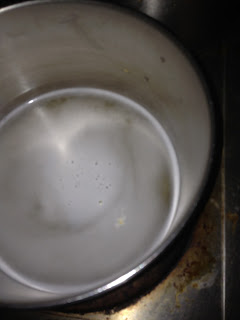The first round requires one to make a session beer, defined by them as 4.5% abv or lower (it's important they say this as everyone seems to have a different definition). Stylistically there really isn't that much there aside from light lagers and British beers (the entire island developing different session styles because of the way beer was taxed). Not willing to reinvent Bud Light and hating beers with that "English" character, I decided to try my hand at a Scottish ale. In order to try and minimize the English-ness of the beer, I used an American yeast instead of a British one (and fermented it cool at that, to minimize the flavor impact there too) and substituted the English hops (Scotland, unable to grow its own hops, relies mostly upon England) with an Austrian hop related to the English varieties.
It still had that "Englishness" pervading through it. It was laughing at me with each sample I took. I knew I had to save this beer, but how?
Taking inspiration from the Norman invasion of 1066, I decided to assault this brew with some French hops. I didn't have enough time to dry hop, and that's kind of an English technique anyway. So instead I made a hop tea, more traditional to German brewing.
I did the tea on thursday and bottled on friday. The character has been mitigated, it seems, and the crisis may be averted. I will only know this once the beer is done bottle conditioning, but I have confidence.
Here are some pictures from the event.
1 oz. of hops carefully weighed out
Hops stapled shut into a coffee filter to act as a tea bag. I didn't account for water absorption, and it eventually burst, but almost all of the hop material stayed out of the tea itself.
Wort, made from DME, for the tea to take place in.
Once the wort got up to 170 degrees fahrenheit, I pulled it off the heat, put the hops in, and let it steep for about 10 minutes. You need to use wort for this (but only a very weak one) in order to change the chemical structure of the water, most importantly the pH. If I did this in just water, it would probably taste of grass. Also, it is important I never let this get to a boil, otherwise the alpha acids in the hops will start to isomerize, making the tea bitter instead of "hoppy". I was considering doing this at the actual bottling phase, but the idea of using DME to bottle makes me a little uneasy -- this is the absolute end of the road for the yeast so I just want to give it some easy sugar to make for a quicker and more complete refermentation. I know the use of "speise" is traditional in Germany, but I'll probably keep that experiment in my pocket for another day -- and save some of the pre-boil wort to use for it to keep it more consistent.
-- Knuttel


